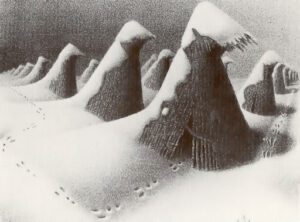Contributor(s): Shared on: 22 December 2020 under the Creative Commons Zero (CC 0) Universal license a Public Domain dedication Categories: Tags: | Contribute a translation | Source (English) |
|---|
|
O Eternal God of ages past and ages yet to come,
Thou who art the everlasting Togetherness, the neverdimming Light, the ever-fulfilling Love,
Whose breath is the Surge of Life, whose pulse is Eternal Creation,
Open Thou the curtains of time for a new year’s unfolding. | |
Lead us to the threshold of things yet unborn.
Make us malleable to learn, flexible to discern, humble in seeking.
Teach us, O God, to see beneath surfaces,
To look beyond small horizons, to rise above trivialities. | |
Be as a mighty sieve to sift us, as the blazing searchlight to brighten the way.
From out of solitude weld us into eternal Fellowship.
From out of complacency stir in us divine discontent.
But from out of fear restore in us the peace of humble striving. | |
Out of sheer dreams bring us enduring visions.
Out of deadly routine point us to pressing purpose.
Out of weakness grant us strength.
Out of indecision bring us guided resolution.
Out of impasse show us direction. | |
Find us and fathom us;
free us;
fulfill us;
fire our imaginations.
Prepare in us Thy divine anticipation,
that we may lay hold of those priceless treasures
that are so easily missed,
so silently lost.
Chasten us but strengthen us;
Replenish us;
renew us;
Transform us now and never ceasingly,
that Thy will be done.
Amen. |
This “Closing Prayer” for New Year’s Day was adapted by Mordecai Kaplan and Eugene Kohn from a prayer first published by unnamed “Members of the Faculty” of the Colgate-Rochester Divinity School (The Colgate-Rochester Divinity School Bulletin, “Prayers for the New Year,” vol. 19 no. 2 (1947), pp. 65-71). Kaplan & Kohn’s adapted prayer essentially contains excerpts from the prayer of the Faculty (excluding any with explicit Christian content). The adapted prayer was published in The Faith of America: Readings, Songs, and Prayers for the Celebration of American Holidays (Jewish Reconstructionist Foundation 1951), p. 25-26. –Aharon Varady Source(s)
Eugene Kohn (January 26, 1887 - April 1, 1977) was an American Reconstructionist rabbi, writer and editor. Born in Newark, New Jersey he attended the Jewish Theological Seminary of America and in 1912 received ordination. It was here that he met Rabbi Mordecai Kaplan who taught him homiletics. Between 1912 and 1939 he served as a congregational rabbi in Conservative synagogues in the U.S. states of Maryland, New Jersey, New York, Wisconsin and Ohio. He also served as the president of the Rabbinical Assembly 1936-1937. He played a central role in the Reconstructionist movement. He edited its journal The Reconstructionist and, alongside Kaplan and Ira Eisenstein, edited The New Haggadah (1941), The Sabbath Prayer Book (1945) and The Reconstructionist Prayer Book (1948). Alongside Jack Cohen, Eisenstein and Milton Steinberg he was one of Kaplan's main disciples. Dr. John Paul Williams (1900-1973) was chairman of the department of religion at Mount Holyoke College. In 1946, he served as president of the National Association of Biblical Instructors (now known as the American Academy of Religion). He wrote What Americans Believe and How They Worship (1952, revised 1962) containing the chapter "Judaism -- the Mother Institution." Together with Rabbi Mordecai Kaplan and Eugene Kohn he co-authored the anthology of civic prayers, Faith in America (1951). Mordecai Menahem Kaplan (June 11, 1881 – November 8, 1983), was a rabbi, essayist and Jewish educator and the co-founder of Reconstructionist Judaism along with his son-in-law Ira Eisenstein. The Colgate Rochester Crozer Divinity School is a seminary in Rochester, New York affiliated with the American Baptist Churches USA. The school is progressive and ecumenical in theology, with Baptists, United Methodists, Presbyterians, Episcopalians and members of other denominations on its faculty and in its student body. The school also shares a partnership with Bexley Hall Seabury-Western Theological Seminary, an Episcopal seminary. It is accredited by the Commission on Accrediting of the Association of Theological Schools. Notable faculty include Walter Rauschenbusch (1861–1918), Baptist pastor and theologian integral to the Social Gospel movement, and Conrad Henry Moehlman (1879–1961), church historian. Notable graduates include Harry Emerson Fosdick (1878-1969), one of the most prominent liberal ministers of the early 20th century. Aharon Varady (M.A.J.Ed./JTSA Davidson) is a volunteer transcriber for the Open Siddur Project. If you find any mistakes in his transcriptions, please let him know. Shgiyot mi yavin; Ministarot naqeni שְׁגִיאוֹת מִי־יָבִין; מִנִּסְתָּרוֹת נַקֵּנִי "Who can know all one's flaws? From hidden errors, correct me" (Psalms 19:13). If you'd like to directly support his work, please consider donating via his Patreon account. (Varady also translates prayers and contributes his own original work besides serving as the primary shammes of the Open Siddur Project and its website, opensiddur.org.) Read a comment / Leave a comment (moderated) Works of related interest: |












Leave a Reply